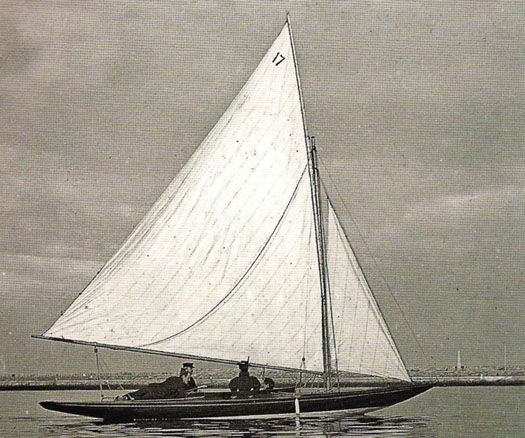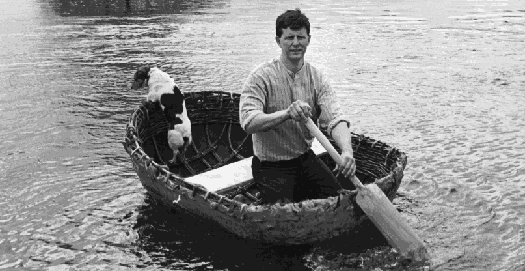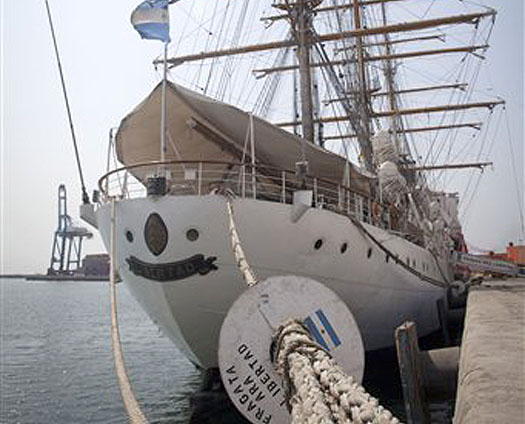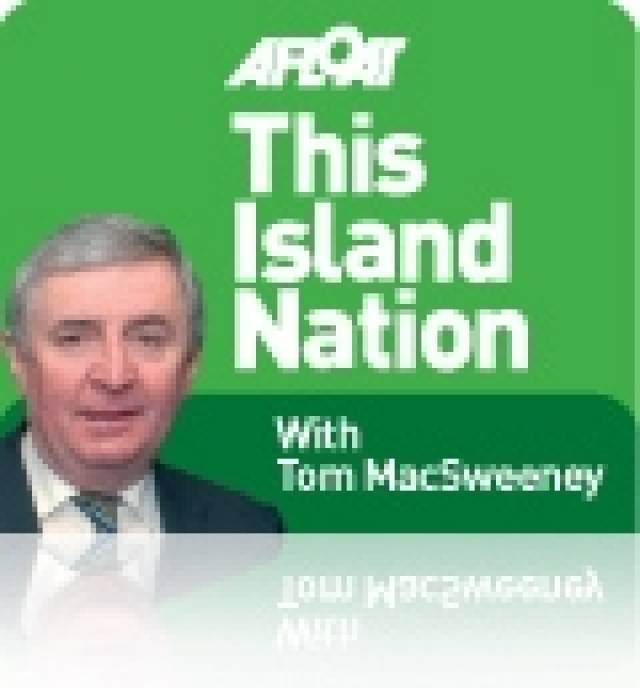This week on THIS ISLAND NATION .... Dublin is the cradle of yacht racing, or is it? ... In shipping the United Nations is warned about dangers to passengers aboard cruise ships ... Environmentalists are accused of trying to damage the seafood industry ... The Boyne sea-going currach and what it means to Irish maritime history.... and Argentina's tall ship defeats greedy American bond-holders.
DUBLIN BAY IS THE CRADLE OF YACHT RACING
Yachting historian Hal Sisk is certain to raise debate in sailing circles with his provocative but, he maintains, very accurate claim that "the relevance of early yachting to our modern sport of yacht racing is negligible."
"Yacht clubs," he says, "delighted in contriving tenuous links with previously defunct clubs to boost their status, imagining that their members were proud successors in an unbroken tradition to named yacht owners of the past."
To whom or who is he possibly referring?
That will form interesting debate about his new publication "Dublin Bay, the Cradle of Yacht Racing," from Peggy Bawn Press, through which he has provided some magnificent books on sailing history. In this one he discusses amateur competitive sailing: "Where and when did our sport emerge? Who took the lead? Who wrote the rules?" he asks and then proceeds to answer the questions with his view that the worldwide sport of yacht and dinghy racing was popularised and formatted by "the pioneering yachtsmen of Dublin Bay."

A one rater in Dublin bay in the mid 1890s from Hal Sisk's new book
Well worth reading – and discussing over the Christmas period – though I think his views will resonate for a lot longer! Hal is a great devotee of the sport of sailing and a doyen amongst those who debate the history of going afloat
He pays strong tribute to the Royal Alfred Yacht Club for its work in starting the sport of yacht racing: "No club achieved more in shaping the worldwide sport in its formative period than Dublin's Royal Alfred YC, Wherever amateur sailors are coming to the line, racing under nationally agreed regulations, they are sailing in the wake of the pioneering yachtsmen of Dublin Bay."
Shipping – UNITED NATIONS WARNED ABOUT CRUISE SHIP SAFETY
Major shortcomings in existing safety regulations for passenger ships have been raised in a series of technical papers tabled by the UK Government at the International Maritime Organisation, the United Nations body responsible for safety at sea. The papers raise fundamental questions about the risk factors used to assess stability requirements for passenger ships and cast doubt over the 'safe return to port' principles which underpin the latest SOLAS (Safety Of Life At Sea) requirements. The UK has also expressed concern over existing rules governing the closure of watertight doors and recommends much stricter controls over their opening.
The international shipping officers' trade union, NAUTILUS, has backed the UK Government's documents which have been submitted to the IMO's Maritime Safety Committee in response to an initiative to re-examine the safety of cruise ships in the wake of the Costa Concordia disaster. This initiative has been started by the Secretary General of the IMO, Koji Sekimizu.
Marine Environment – ENVIRONMENTALISTS ACCUSED OF DAMAGING IRISH SEAFOOD INDUSTRY
While anglers and environmentalists have fears about the impact of sea lice from fish farms on wild fish, the call by environmental organisations for a boycott of Irish smoked salmon at Christmastime is a step too far in their campaigning. There are on-going battles over proposals for a large farm development in the Bantry Bay area and the State fisheries board, Bord Iascaigh Mhara, is at loggerheads with opponents over its plans for a big farm offshore of Galway Bay. The debate about sea lice has been going on for many years and there are strong arguments on both sides. There are vested interests on both sides, but the reality is that the vast majority of salmon eaten in Ireland, whether at home or in catering establishments is farmed, whether Irish-produced or imported from abroad. There is very little wild caught salmon now available for consumption and the cost is beyond the level of most people. In the future there is no doubt that aquaculture will provide more of the world's fish consumption. Whatever the rights and wrongs of this debate, to deliberately damage the reputation of the Irish seafood industry is a step too far and to call for a boycott of Irish smoked salmon products this Christmas is an attempt to damage businesses and jobs. It is unacceptable and the environmentalists responsible for suggesting this should withdraw their attempt to damage Irish products.
Maritime History – BUILDING A SEA-GOING CURRACH ON THE BOYNE
On what type of craft did the earliest settlers arrive in Ireland?
A currach-maker on the banks of the Boyne has been spending a lot of time and effort trying to answer that question. He has been working on a 36ft. craft of a style and sturdiness that might have been the type of vessel involved. If he is correct, he also believes that this type of boat may have been used to transport the giant stones that were used to build the great passage tomb at Newgrange.
Claidhbh Ó Gibne is the man providing insights into how large sea-going craft may have been constructed in prehistoric Ireland.

Claidhbh O Gibne in his first currach on the Boyne with his companion Jack Russell
Living on the banks of the Boyne Claidhbh Ó Gibne became intrigued with the river's distinctive traditional currach, because of its simplicity of form and, through its raw materials, direct connection with the earliest journeys undertaken by the people of the Europe who arrived on Irish shores. The Boyne Currach Centre, opened in 1997, was a huge achievement in his life and is where he has produced different prototypes of sea currachs made from tanned cowhides and hazel baskets. The Boyne currach is the last remaining wicker craft woven from hazel rods, covered with animal skin and regarded as Ireland's smallest currach. Written accounts show it being used from the 1360s.
"Although this small wicker craft became synonymous with the River Boyne, as it was an ideal vessel for trapping salmon, it also holds the thumbprint for reproducing the greater ocean-going crafts of which there are many recorded accounts throughout our history," he says. So he began building currachs from organic materials which had been widely used over thousands of years, moulding and shaping rawhide, sinew, leather, hazel, feather and bone.
• Claidhbh Ó Gibne's book, 'The Boyne Currach, from beneath the shadows of Newgrange,' is in the bookshops.
Tall Ships – ARGENTINA GETS UNITED NATIONS BACKING TO RELEASE TALL SHIP
A United Nations court has ordered the immediate release of the Libertad, Argentina's naval training tall ship which has been detained in Ghana for two months after a USA court decision in favour of bond holders who claim that Argentina has defaulted on loans it owes them. Argentina appealed to the U.N.'s International Tribunal for the Law of the Sea for the ship's release, arguing that as a warship the Libertad is immune from being seized. The court ordered that Ghana "forthwith and unconditionally release the frigate ARA Libertad" and ensure the ship and its crew can leave Ghanaian waters. It also ordered that the vessel be resupplied as needed.

Libertad held in Ghana
Argentina hailed the decision and vowed to continue fighting what President Cristina Fernandez has called "vulture funds," with which the country is locked in a series of legal battles.
Cayman Islands-based NML Capital Ltd. owned by American billionaire Paul Singer is leading a group demanding payment in full, plus interest - about $350 million - for dollar-based Argentine bonds bought at fire sale prices after Argentina's 2001-2002 economic collapse forced a sharp devaluation of its currency. The vast majority of bondholders accepted about 30 cents on the dollar years ago, and that is roughly what the holdouts led by Singer initially paid for the bonds. This is an example of the greed of bond holders.
NML criticized the U.N. Law of the Sea Tribunal for making the ruling. Argentina's Defence Minister, Arturo Puricelli, said at a news conference in Buenos Aires that a charted plane would deliver 98 more sailors to Ghana this week to join the skeleton crew that stayed with the Libertad, to which power and water supplies had been cut off. He estimated the sailing ship could return to Buenos Aires by Jan. 9
Email: [email protected]
Regular news from Tom MacSweeney on Twitter: @TomMacSweeney
































































